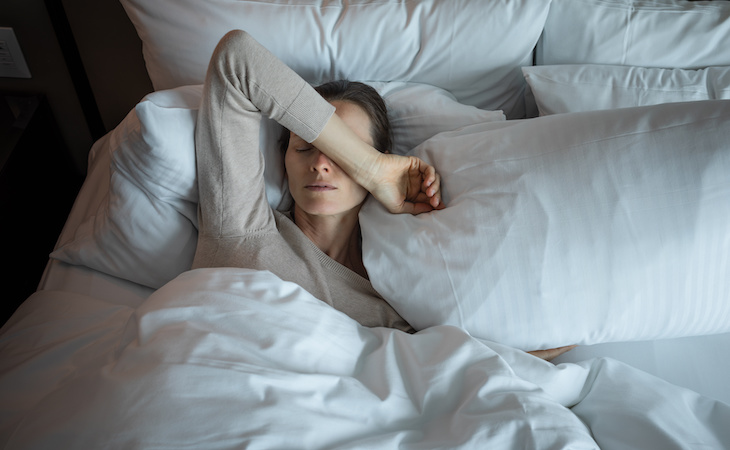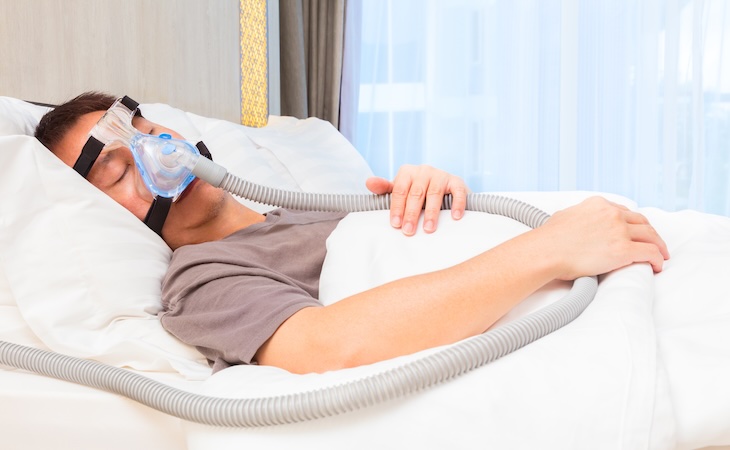All of us want to wake up and start the day feeling refreshed. But a surprising one in 13 of us will experience the opposite feeling—more specifically, a morning headache.
Yep, it’s entirely possible to wake up with a tension headache that you feel as soon as you begin to stir. The Mayo Clinic describes a tension headache as a diffuse, mild to moderate pain that often feels like a tight band around your head.
Max Kerr, DDS, diplomate of the American Board of Dental Sleep Medicine with Sleep Better Austin, says that tension headaches are different from other headaches because they tend to originate from muscular or connective tissue. Migraines and cluster headaches, meanwhile, tend to occur due to changes in your blood vessels and nerves.
So why do you keep waking up with a headache—and what can you do about it? There are many potential causes—but luckily, there are also plenty of remedies that can help you feel better fast.
Why did I wake up with a headache?
This might be a question you’ve been pondering if you keep waking up with a headache day after day. Generally, Kerr says that tension headaches are caused by stressing the musculature of the head, neck, and face.
The following ailments can lead to morning tension headaches:
Insomnia
Do you suffer from insomnia? A diagnosis that is often self-reported, says Kerr, insomnia is a common sleep disorder that can make it difficult to fall asleep, stay asleep, or cause you to wake up too early and not be able to go back to sleep. And it can bring on headaches.
“Insomnia will often cause tension headaches through over-stressing the body,” Kerr explains. “Without proper sleep, our body maintains a chronic ‘fight or flight’ response which creates muscle tightness, increased respiration, clenching of teeth, and reduced pain tolerance among many other negative effects. These side effects of insomnia will often lead to tension headaches.”
Depression or anxiety
You may be surprised to learn that mood issues can lead to waking up with a headache. The mechanics are quite similar to headaches that are brought on by insomnia.
Kerr says that mood issues are often caused by that same fight or flight response, which is scientifically known as “sympathetic nervous activation.” The sympathetic nervous system is intended to protect us from being hurt or killed, but only for short periods. When the body is in a nonstop fight or flight state, depression and/or anxiety can follow.
“Anyone who has ever been affected with depression and/or anxiety knows that the uncontrollable, usually negative, racing thoughts are the main problem,” Kerr says. “This bodily state and brain function make it extremely difficult to get adequate and restful sleep, which will contribute to the tension headaches for many of the same reasons that insomnia does.”
Snoring or sleep apnea
Although snoring and sleep apnea can be disruptive to a partner’s sleep, it can be just as disruptive for you if you’re waking up with tension headaches.
“Snoring and sleep apnea both fall under the umbrella of conditions known as ‘sleep-disordered breathing disorders,'” Kerr shares. “Snoring and sleep apnea will present together as well as separately.”
Kerr explains that sleep-disordered breathing is measured by the degree of blockage within your airway during sleep. “If there is minor blockage of the airway during sleep and it only causes turbulent airflow, then you will have snoring,” he says. “If the airway partially or totally closes enough to reduce your body’s oxygen content, then you have sleep apnea.”
Kerr says that since breathing is arguably the most important function of the body, it will do whatever it can to maintain an open airway. “This means that the body often clenches its teeth or postures its head forward to open the airway,” he says. “This will cause tension in the muscles of the head and neck.”
Teeth grinding
“Teeth grinding is often caused by an obstructed airway,” Kerr says. “It is thought that when the body feels as though the airway is collapsing, it will tighten the muscles in the head and neck.”
By tightening these muscles, your body makes the walls of your airway more rigid and resistant to collapse. “This also can prevent the tongue from falling back into the throat,” says Kerr. “We see the body react in the same fashion in people that tend to mouth breathe as well as people that are stressed.”
In other words, all of this muscle clenching in your head and face can contribute to morning headaches, not to mention jaw pain and premature tooth loss.
Excessive alcohol use
Drinking too much alcohol can be detrimental to the body in a number of ways, including causing you to wake up with a headache.
“Research suggests that even one drink before bed can prevent us from getting to deep sleep and/or REM sleep,” Kerr says. “REM sleep is a vital part of our sleep cycle that helps to recharge and repair our central nervous system.”
As for tension headaches, Kerr says that these can come about after an evening of libations because poor sleeping posture can be attributed to drinking before sleep.
Strained muscles in the neck
“Strained muscles in the neck can be caused by a myriad of issues,” Kerr says. “It could be that your back is not adequately strengthened, that your daytime posture is poor, that you are looking down at your phone or computer too long, and even that your airway is obstructed during the day and night, requiring that you posture your neck forward to open your airway.”
This over-activation of muscles in your head and neck can lead to tenderness, pain, and yes, tension headaches.
How to relieve a tension headache
Even though you may wake up feeling less than great, you can relieve a tension headache through these helpful fixes:
Use heat or cold
For morning tension headaches, Kerr recommends heat over cold. “Heat with a balm or heating pad will loosen the tight and overworked muscles of the head and neck,” he says. “This relaxation of the muscle fibers will allow for healing blood flow.”
Massage your neck and temples
Self-massage can be quite beneficial to one’s muscles, especially when it comes to tension headaches.
“Massaging your temples and the muscles of the head and neck will loosen sore and tight muscles as well as release bound connective tissue,” Kerr says. “This will allow for more healing blood flow to the area as well as allow for the head and neck to regain more natural movement.”
Practice relaxation techniques
Since morning tension headaches can be rooted in the fight or flight mode and its accompanying stress, relaxation techniques prove to be effective.
These relaxation exercises can include slow breathing and meditation, which can combat those fight or flight feelings.
“We can take our body out of a fight or flight state by teaching it that everything is OK,” says Kerr. “We do this by slow, methodical breathing and by not attaching our total awareness to racing thoughts in our head.”
He recommends using a meditation app every day, along with the following breathing technique to inspire those chill vibes, something that’s known as “Box Breathing”:
- Inhale to the count of 4.
- Hold for a count of 4.
- Exhale for a count of 4.
- Hold for a count of 4.
- Repeat for 3-5 minutes.
Take medication
If all else fails, medication could do the trick—but you should always consult your doctor before starting any medicine or supplement.
“Your physician may want to put you on a pain reliever or a muscle relaxer,” Kerr says. “These medications can prove very beneficial in cases of acute intense pain but will become problematic in the long run.”
Instead, Kerr says he’s a proponent of taking “a good fish oil supplement and turmeric supplement to reduce the inflammation of the muscles.” He also says that it’s key to supplement with magnesium, which will “relax the muscles and have a calming effect prior to sleep.”
Need more ideas to help you destress before bed so you can ward off that morning headache? Here are 10 nighttime activities to help you relax.




